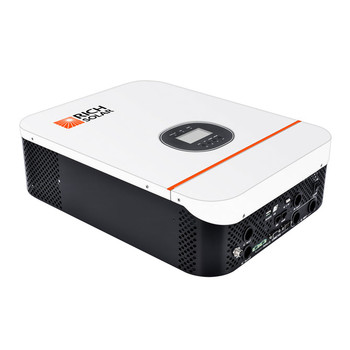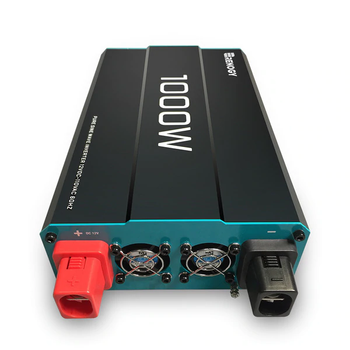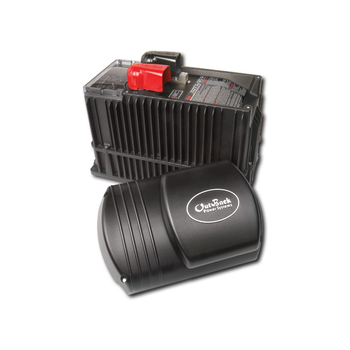Off Grid Inverters
Off-grid inverters are used in systems that are not connected to the utility grid. These inverters convert the DC power generated by the renewable energy sources into AC power that can be used in the home or business. Off-grid systems usually have a battery bank to store excess energy for use when the renewable energy sources are not producing enough power.
There are two main types of off-grid inverters: modified sine wave inverters and pure sine wave inverters. The main difference between these two types is the quality of the AC waveform they produce.
Modified sine wave inverters produce an AC waveform that is a rough approximation of a sine wave. The waveform is not a perfect sinusoidal shape, but rather a stepped waveform that is designed to mimic the shape of a sine wave. Modified sine wave inverters are less expensive than pure sine wave inverters and are suitable for powering most types of electrical devices. However, some sensitive electronic devices, such as certain types of audio and video equipment, may experience distortion or interference when powered by a modified sine wave inverter.
Pure sine wave inverters produce a smooth, high-quality AC waveform that is virtually identical to the waveform produced by a utility power grid. The waveform is a perfect sinusoidal shape, which is ideal for powering sensitive electronic equipment that requires a clean power supply. Pure sine wave inverters are more expensive than modified sine wave inverters, but they are necessary for some applications, such as medical equipment, certain types of audio and video equipment, and high-end computing systems.
In general, pure sine wave inverters are the preferred choice for most applications, as they provide a clean and stable power supply that is ideal for powering sensitive electronic devices. However, for applications where cost is a primary concern or where only basic electrical devices need to be powered, a modified sine wave inverter may be a suitable alternative.
-


Rich Solar
MSRP: $219.99$187.99This is a compact and highly portable power inverter that has an excellent track record in the field of high-frequency inverters. From the 12V DC outlet in your applications e.g., vehicle or boat, or directly from a dedicated 12V DC battery, this...MSRP: $219.99$187.99 -


Rich Solar
FEATURES Pure Sine Wave Inverter LED Display WI-FI/GPRS Remote Monitoring (optional) With CAN/RS486 for BMS Communication Integrated MPPT charge controller Configurable grid or solar input priority 48V Battery System Compatible to... -


Rich Solar
$1,599.99FEATURES Pure sine wave inverter Configurable color with the built-in RGB LED bar Built-in Wi-Fi for mobile monitoring (APP is required) Supports USB On-the-Go function Built-in anti-dusk kit Detachable LCD control module with...$1,599.99 -


Renogy
$224.99Renogy 1000W 12V Pure Sine Wave Inverter The Renogy 1000W 12V Pure Sine Wave Inverter is a high-quality and efficient power inverter designed for use in off-grid solar systems. With its pure sine wave output, this inverter...$224.99 -

OutBack Power
The OutBack Power FXR series inverters are a more advanced version of the venerable FX series. These new inverters are a good choice for off-grid or, with the 24 VDC and 48 VDC inverters, can be used in a grid-tied system. They have expanded... -

OutBack Power
The OutBack Power FXR series inverters are a more advanced version of the venerable FX series. These new inverters are a good choice for off-grid or, with the 24 VDC and 48 VDC inverters, can be used in a grid-tied system. They have... -

OutBack Power
The OutBack Power FXR series inverters are a more advanced version of the venerable FX series. These new inverters are a good choice for off-grid or, with the 24 VDC and 48 VDC inverters, can be used in a grid-tied system. They have expanded... -

OutBack Power
The OutBack Power FXR series inverters are a more advanced version of the venerable FX series. These new inverters are a good choice for off-grid or, with the 24 VDC and 48 VDC inverters, can be used in a grid-tied system. They have expanded... -

OutBack Power
The OutBack Power FXR series inverters are a more advanced version of the venerable FX series. These new inverters are a good choice for off-grid or, with the 24 VDC and 48 VDC inverters, can be used in a grid-tied system. They have expanded... -

OutBack Power
The OutBack Power FXR series inverters are a more advanced version of the venerable FX series. These new inverters are a good choice for off-grid or, with the 24 VDC and 48 VDC inverters, can be used in a grid-tied system. They have...
Frequently Asked Questions About Off Grid Inverters
A: An off-grid inverter is a device that converts DC (direct current) power generated by batteries into AC (alternating current) power that can be used by appliances and electronics.
A: Off-grid inverters work by converting DC power from a battery bank into AC power that can be used to power household appliances and electronics. The inverter uses various electronics to regulate the voltage and frequency of the AC output.
A: The main benefit of using an off-grid inverter is that it allows you to use alternative energy sources to power your home or business without being connected to the electrical grid. This can save you money on your energy bills and reduce your dependence on fossil fuels.
A: There are two main types of off-grid inverters: pure sine wave and modified sine wave. Pure sine wave inverters produce a clean and stable AC output that is suitable for sensitive electronics and appliances, while modified sine wave inverters produce a less stable AC output that may cause problems with some electronics and appliances (particularly LED lights).
A: To choose the right off-grid inverter for your needs, you will need to consider factors such as the size and voltage of your battery bank, the capacity of your alternative energy source, the voltage and frequency of your AC loads, and your budget. You may also want to consult with a professional installer or supplier to get expert advice.
A: No, off-grid inverters are designed to be used with standalone solar systems that are not connected to the electrical grid. If you have a grid-tied solar system, you will need to use a grid-tie inverter that is compatible with your local utility's requirements.
A: Installing an off-grid inverter can be a complex process that involves wiring, grounding, and configuring the inverter's settings. It is recommended that you hire a professional installer with experience in off-grid solar systems to ensure that the installation is done safely and correctly.
A: Off-grid inverters typically require minimal maintenance, but it is important to check the battery bank and alternative energy source regularly to ensure that they are functioning properly. You may also need to periodically clean the inverter's ventilation system to prevent overheating and damage to the internal components.
